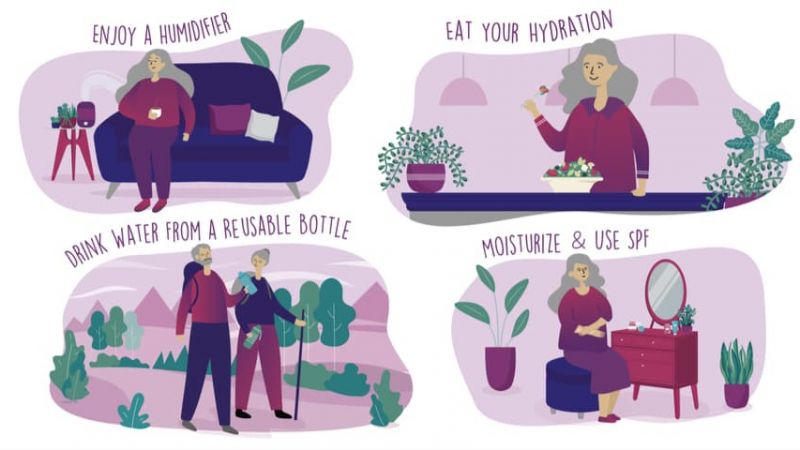Dehydration in the elderly can be a sneaky thing — it is a common cause of hospitalization among older adults because by the time signs and symptoms of dehydration appear — it can already be too late. The sense of thirst diminishes with age and as a result, according to The Cleveland Clinic, many older adults don’t drink enough water because they simply don’t feel thirsty. Seniors are also at greater risk of dehydration because our bodies retain less water as we age. This is why it becomes increasingly important to senior health to stay hydrated.
While the intense heat of summer months can be a good external reminder to drink more water, when the cold weather rolls around that mentality shouldn’t change, although too often it does. The winter months can actually be worse for dehydration in the elderly, as sweat evaporates more rapidly in the cold, dry air — which also further reduces the body’s sense of a need for thirst. For these reasons, finding ways to incorporate hydration into a self-care routine can be vital to maintaining senior health during the winter.
Tips For Winter Hydration in the Elderly
Maintaining hydration in the elderly during winter months should be an all-day affair in order to yield the best results. Here are some ways that you can incorporate hydration into aspects of your daily routine:
Moisturize Face And Body
Using moisturizer daily for your face and body is a great way to add moisture back into your skin and keep it trapped there. Or, as one Harvard Health article describes it, “they supply a little bit of water to the skin and contain a greasy substance that holds it in.” As an added benefit, use a lightweight SPF over your daily moisturizer or use a moisturizer with SPF to also keep you protected from the sun’s harmful rays, no matter the season.
Keep a Water Bottle On-Hand
Of course, a big part of maintaining hydration in the elderly is drinking plenty of water, especially if you take prescription medications that can cause dry mouth. Carrying around a portable water bottle is a great way to get into the habit of drinking water throughout the day
Use A Humidifier
Between the cold, dry air outside and the hot, dry air that heats your home in winter months, your whole body can feel dehydrated and dry. Using a humidifier can help to maintain your body’s hydration by keeping moisture in the atmosphere of your home. Humidifiers also help to support saliva production, alleviate dry, itchy skin, and decrease snoring.
Make Dietary Changes
Incorporating water-dense fruits and vegetables into your diet, such as cucumbers, lettuce, celery, spinach, and oranges, can be a discreet way of sneaking more water into your daily routine. Soups and stews are also great options to add to the menu, as they are made with a significant amount of liquid, which can aid in hydration in the elderly.
Invest In A Safety Net
Because older adults are less likely to feel the thirst sensation when their body needs water, the symptoms of dehydration in the elderly might not appear until a serious health concern is underway. Should you feel fatigue, dizziness, and confusion, along with less frequent urination or dark-colored urination, you are most likely in the throes of dehydration and need to seek medical attention immediately.
When you have a Medical Guardian medical alert device, however, you will have a constant connection to help should you need it, even for dehydration. With Medical Guardian, you’ll never have to worry about experiencing a medical emergency alone, which is the greatest forms of self-care there is.

